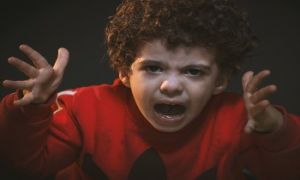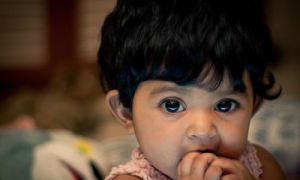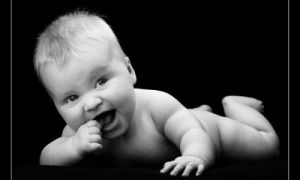A school age child’s physical development has increased considerably at this point. Gross motor skills such as running, climbing etc. are of ease and a need of challenging physical activities are required (such as roller skating, bike riding, tennis etc.). There is an increase in balance, co-ordination and a confidence in using and experimenting with outdoor equipment (monkey bars, climbing frames, etc.). School age children can sometimes push the boundaries in their physical abilities and tend to have frequent minor accidents during games and while playing.
Gross Motor Development Milestones from 6 years+
- skips on alternate feet
- walks easily on a narrow line
- runs on tippy toes
- can stand on one foot
- can catch ball in hands
- throws and kicks with considerable ability
- can hop on one foot ten times or more, both right and left
- can ride a bike (with or without trainer wheels)
- is active and skilful in climbing, swinging, sliding etc
- enjoys and participates in team games
- skills develop with small size ball (able to catch with one hand)
- enhances game skills (e.g. hopscotch and jump rope)
- rides a two wheeler bike
- runs up and down stairs
During this stage, it’s important for school age children to become involved in outdoor sports that enables them to extend their physical abilities. Activities such as swimming, soccer, gymnastics or running will strengthen your child’s physical attributes as well as get them actively involved in staying fit and healthy in a fun and exciting way.


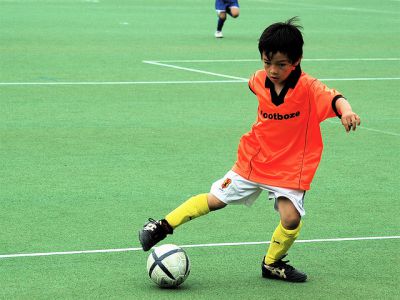
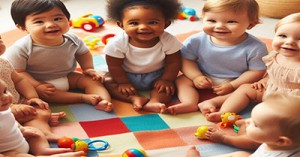

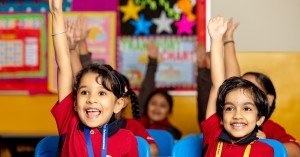
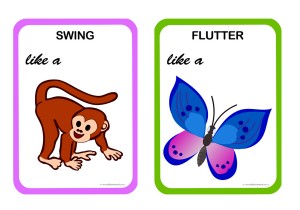
 Toddlers have a greater understanding of the world around them by this stage. Their cognitive development (also known as intellectual development and thinking skills) continues
Toddlers have a greater understanding of the world around them by this stage. Their cognitive development (also known as intellectual development and thinking skills) continues Infants begin to develop trust when parents begin to fulfil their needs. Such as changing an infant's nappy when needed, feeding on request and holding
Infants begin to develop trust when parents begin to fulfil their needs. Such as changing an infant's nappy when needed, feeding on request and holding Beginning at birth the construction of thought processes, such as memory, problem solving, exploration of objects etc, is an important part of an infant’s cognitive
Beginning at birth the construction of thought processes, such as memory, problem solving, exploration of objects etc, is an important part of an infant’s cognitive Toddlers want to do more on their own and do not like it when you begin to establish limits on their behaviour. Tantrums can become
Toddlers want to do more on their own and do not like it when you begin to establish limits on their behaviour. Tantrums can become Your preschooler is now able to focus their attention more accurately and is less influenced by distractions. The intensity of questions increase as your child
Your preschooler is now able to focus their attention more accurately and is less influenced by distractions. The intensity of questions increase as your child John Dewey is often seen as the proponent of learning by doing – rather than learning by passively receiving. He believed that each child was active,
John Dewey is often seen as the proponent of learning by doing – rather than learning by passively receiving. He believed that each child was active, Toddler advance and gains new skills in Gross Motor Development milestones achieved throughout earlier years. Co-ordination and challenges that could not be performed before such
Toddler advance and gains new skills in Gross Motor Development milestones achieved throughout earlier years. Co-ordination and challenges that could not be performed before such Erik Erikson developed a psychosocial theory to understand how we each develop our identities through eight stages of psychosocial development from infancy to adulthood. The
Erik Erikson developed a psychosocial theory to understand how we each develop our identities through eight stages of psychosocial development from infancy to adulthood. The At this point preschoolers begin to interact effectively with others. Play becomes more innovative and organized and “boyfriend” or “girlfriend” begins to emerge. Preschoolers have
At this point preschoolers begin to interact effectively with others. Play becomes more innovative and organized and “boyfriend” or “girlfriend” begins to emerge. Preschoolers have From now, babies begin to identify and respond to their own feelings, understanding other's feelings & needs and interact positively with others. A baby's social and
From now, babies begin to identify and respond to their own feelings, understanding other's feelings & needs and interact positively with others. A baby's social and